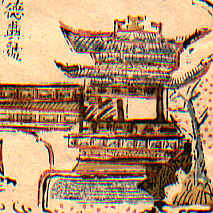Donation Tax of
the Ching Dynasty 
Donations from the merchants and rich people was an occasional source of income to the government and was triggered by unusual events, such as civil wars and disasters beyond the expectation or control of the imperial government. Only under such special circumstances, would the government urge people to donate. In addition, from the latter part of the Ming Dynasty, donation of sycee in exchange for official titles was a means to raise the governmental revenue, however, it was seriously criticized by conservatives and intellectuals.
Following the Taiping Rebellion, the Ching imperial government, instead of increasing taxes, adopted the strategy of collecting "donations" from taxpayers as an important financial aid, from that time, the diplomas of the imperial university and official titles all became commodities available for the covered "donation".
Due to the "decentralization" of the empire caused by the Taiping Rebellion, local governments collected more but paid less to the imperial government, moreover, many tax levies were implemented in the name of "donation", whether the imperial government approved them or not, given the weakened state of the imperial government, the emperor could do nothing about the practice. Hence, no detailed information can show how much money was collected as donation in China, but, it can be assured that only a fraction was submitted to the imperial government.
- Certificates of Donation Issued by the Central Government
- Certificates of Donation Issued by the Local Governments
- Donation tax silver specimens
Return to Related Subjects